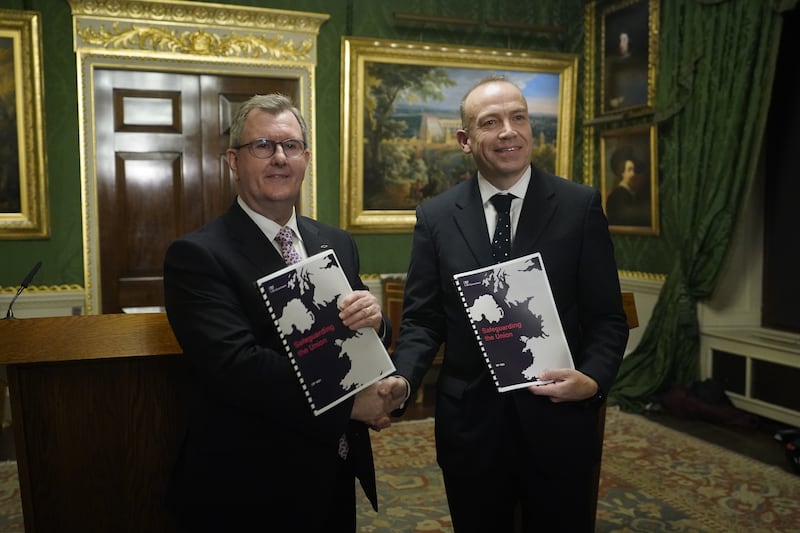Contrasting fortunes for the north’s two main parties in 2024.
A roller coaster for Sinn Féin, ending the year better than they feared and many had predicted.
For the DUP, the past year has been the worst in more than a decade.
Riven by division and disarray, the party lost 8.5% of its Westminster vote share in July and has polled consistently badly since.
The origins of the turmoil are of course Brexit and its inevitable consequences, the direct opposite of the reason the DUP supported the disastrous policy.
They thought leaving the EU would produce a hard British border in Ireland and undo the gains of the Good Friday Agreement and the all-island economy.
Instead, the Brexit policy the DUP stupidly espoused produced a trade border in the Irish Sea. The DUP have refused to own their mistake.
They’re still campaigning to undo what they had originally supported in 2019 “to get Brexit done”. The latest stunt, pointlessly pulling the ‘Stormont Brake’, is just picking at the scab.
The DUP divide yawned open in January this year when fictional negotiations with the British government since summer 2023 produced the ‘Safeguarding the Union’ paper.

The then DUP leader Donaldson forced it through a farcical, acrimonious party executive meeting on January 29.
The British document didn’t alter a syllable in the Irish Protocol or the Windsor Framework of 2023, something which was glaringly obvious to everyone except Donaldson and his fellow ‘negotiators’ Gavin Robinson and Emma Little-Pengelly.
Half the party officer board was opposed, as were half the party’s MPs who vociferously rejected it, including Carla Lockhart, Sammy Wilson and Ian Paisley Jnr. The DUP MLAs were and remain hopelessly divided on the matter.
Nevertheless, Donaldson ordered the party back into the assembly and formed an executive accepting Sinn Féin’s Michelle O’Neill as First Minister. The divisions these decisions caused have never healed.
They gave Jim Allister and his TUV the opening they needed when Rishi Sunak called a general election at the worst possible moment for the DUP.
The party was suffering its worst crisis since 2010, when Peter Robinson’s wife Iris was discovered having an affair with a 19-year old. Donaldson had been arrested at Easter and charged with historical sexual offences, which he has denied.
In the election, the DUP lost three seats and saw the fall of the ‘house of Paisley’ in North Antrim after 50 years to arch-rival Jim Allister. The only saving grace was that the new leader, the dull, uninspiring Gavin Robinson, held on to his East Belfast seat.

By contrast everything was going so well for Sinn Féin. They took the position of First Minister at Stormont, something, as Michelle O’Neill pointed out, the invention of the north had been devised to ensure couldn’t happen.
They kept all their seats in the British election, demonstrating the impact of accelerating demographic change.
For example, in Fermanagh/South Tyrone, they fielded their star candidate Pat Cullen, former general secretary of the Royal College of Nursing.
The growth of the nationalist vote meant Cullen boosted the 2019 Sinn Féin majority from 57 to 4,486, and increased the vote share by 6.5%. Fermanagh/South Tyrone is no longer marginal.

Then in September it all went pear-shaped when it was revealed Sinn Féin press officers had given references for a former colleague despite him being investigated for child sex offences.
For the next month the party was engulfed in a media storm as more and more revelations emerged.
Then Niall Ó Donnghaile, former Sinn Féin leader in the Seanad, admitted he had sent unwanted texts to a teenager in 2023 and had been suspended from the party. However, Sinn Féin had kept the reason for his suspension secret.

The whole mishandled saga exposed widespread incompetence and mismanagement in Sinn Féin as well as jiggery-pokery with public funding.
Luckily for the party, the general public were less exercised by internal shortcomings than the anti-Sinn Féin media, so they recovered well to come second in the south’s general election in November.
Nevertheless they took a hit, losing over 100,000 votes on their 2020 result.
Happily for both the DUP and Sinn Féin, there are a couple of election-free years ahead. Time to get their houses in order.
In the case of Sinn Féin, professional managerial reorganisation here, and policy reorientation in the south.
For the DUP, to heal the rifts, keep the TUV at bay and manage the decline of unionism, a more intractable task.
Happy New Year.



